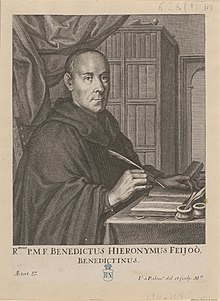Benito Jerónimo Feijoo
Benito Jerónimo Feijoo y Montenegro [ beˈnito xeˈɾonimo feiˈxoo i monteˈneɰɾo ] (* October 8, 1676 in Casdemiro in what is now the province of Ourense ; † September 26, 1764 in Oviedo ; also: Hieronymite Benito Feijoo ) was a Spanish religious and scholar who was the forerunner the Enlightenment promoted scientific thinking in Spain.
Live and act
Feijoo was the eldest of ten siblings and as such could have claimed the birthright . However, he renounced it and joined the Benedictine monastery of San Juan in Samos (Galicia) at the age of 13 . He attended the Colegio de San Esteban in Ribas de Sil, Real Colegio de San Esteban de Rivas de Sil and from 1692 the Colegio de San Salvador in Lérez (Pontevedra), Monasterio de San Julián de Samos, to study art. Three years later he was sent by his superiors to study theology at the Colegio de San Vicente in Salamanca . He then studied for another three years at the Colegio de San Pedro de Eslonza ( León ). He was in the Monastery of San Juan in Samos for ordained priests .
From 1709 until the end of his life, Feijoo lived in Oviedo, where he taught theology and philosophy at the university until his retirement in 1739 . He was twice abbot of the monastery of San Vicente. After his death, Benito Jerónimo Feijoo was buried under the altar steps of the monastery church.
Works
Feijoo began literary production in 1725. That year his Carta Apologética de la Medicina Escéptica, del doctor Martínez appeared . His main works are Teatro crítico universal (8 volumes, 1726–1739) and Cartas eruditas y curiosas (5 volumes, 1742–1760).
Feijoo deals with a wide range of subjects in his works, including education, law, medicine and art, which is why they are encyclopedic in nature. Other topics are superstition and popular belief , which he tries to refute. He is therefore also known as the "Enlightenment of Spain".
Cartas eruditas y curiosas is a collection of learned letters published between 1742 and 1760. Translations into French, Portuguese, English and Italian were published during his lifetime.
Feijoo is also important as a writer in the Galician language .
expenditure
- Teatro Crítico Universal (Madrid, 1726–1739, supplementary volume 1740)
- Cartas Eruditas y Curiosas (Madrid, 1742–1760, supplementary volumes 1781 and 1783)
- Modern edition: Teatro crítico universal. Edited by Ángel-Raimundo Fernández González, 4th edition, Madrid: Cátedra, 1989. ISBN 84-376-0252-1
- Apología del escepticismo médico. 1725
- Defensa de las mujeres. 1726
- Satisfacción al Escrupuloso. 1727
- Respuesta al discurso fisiológico-médico. 1727
- Ilustración apologética. 1729
- Suplemento de el Teatro Crítico. 1740
- Justa repulsa de inicuas acusaciones. 1749
- Adiciones. 1783
- Epistolario.
Web links
- Literature by and about Benito Jerónimo Feijoo in the catalog of the German National Library
- Biblioteca Feijoniana some digitized works in Spanish
- Spain's first feminist in Zeit Online History, September 26, 2014
Individual evidence
- ^ The Encyclopedia Americana (1920) / Cartas of Feijóo
- ^ Fundación Santa María; Buenaventura Delgado Criado; Bernabé Bartolomé Martínez (ed.): Historia de la educación en España y América. Fundación Santa María. Ediciones Morata, 1993, ISBN 84-7112-376-2 , pp. 725 f.
| personal data | |
|---|---|
| SURNAME | Feijoo, Benito Jerónimo |
| ALTERNATIVE NAMES | Feijoo, Hieronymite Benito; Feijoo y Montenegro, Benito Jerónimo |
| BRIEF DESCRIPTION | Spanish religious and scholar, precursor of the Enlightenment |
| DATE OF BIRTH | October 8, 1676 |
| PLACE OF BIRTH | Casdemiro, Ourense Province |
| DATE OF DEATH | September 26, 1764 |
| Place of death | Oviedo |
